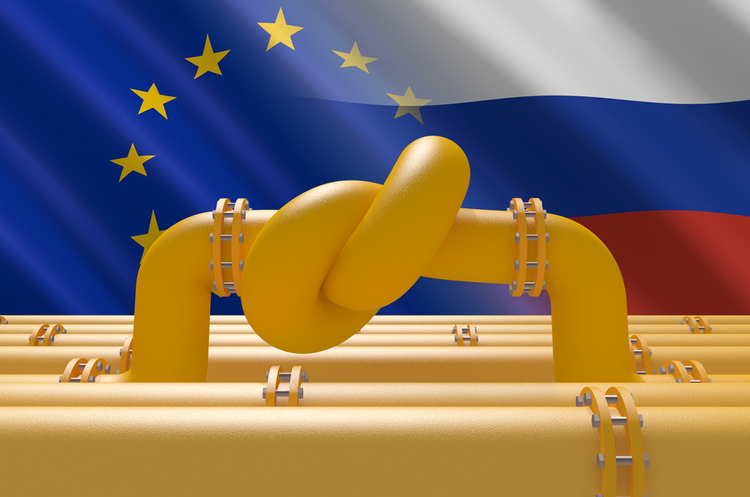Will Europe be buying russian gas if putin is overthrown?
Bankruptcy of Nord Stream 2 AG postponed once again

While experts argue over who "won" or "lost" in the "civil war in russia", which we became spectators to last weekend, the issue of the role of russian gas in Europe has taken on new colours on the political agenda.
Recent events have significantly broadened the permissible limits. Thus, it's quite likely that we've only witnessed the first act. Now, neither a new uprising nor a military coup in the kremlin seem overly fantastical possibilities. Among Western observers, the question has again arisen: will Gazprom's gas supplies return to EU countries if the putin era ends in russia?
Gas United. Svitlana Dolinchuk's original Telegram channel:
- About the real gas business, based on common sense.
- How energy resources are traded in Ukraine and the world during the war.
- Facts, trends, comments.
What about the Nord Streams? Fuel to the fire of discussions and assumptions was added by the decision of a Swiss canton court of Zug, which last Thursday, June 22, postponed the bankruptcy of the Nord Stream 2 pipeline operator – for the fourth time. The moratorium for Nord Stream 2 AG has been extended for six months – until January 10, 2024. The interim manager remains the company Transliq AG.
As of today, one of the pipeline strands is filled with gas. The other one suffered damage as a result of sabotage in September 2022.
What is the reason for such a decision? The decision to postpone the bankruptcy of Nord Stream 2 AG was made against the backdrop of widespread discussion in Germany on the prospects of industrial enterprises, the competitiveness of which depends on access to cheap energy carriers.
This is a pressing issue, particularly for the chemical industry, which uses gas as a raw material for the production of nitrogen fertilisers. After Gazprom restricted the supply of the resource through pipelines, German businesses started looking for alternative resources in the Middle East and Africa, seeking financial and political support from Olaf Scholz's government, and also making decisions about relocating production to the USA, where the Joe Biden administration ensures relatively stable energy prices and creates incentives for "green" technologies, providing strong state support.
"Steel manufacturers, fertiliser, chemical substances, batteries, car manufacturers are moving to the USA from Europe, destabilised by russia's war... As sharp jumps in energy prices and constant problems with supply chains threaten Europe, as some economists warn, with a new era of deindustrialisation, Washington has presented numerous incentives for production and clean energy. As a result, the playing field is increasingly tilted in favour of America, especially for companies betting on projects for the production of energy-intensive products," The Wall Street Journal reports.
What if Nord Stream 2 is revived? Despite the efforts of lobbyists, talks of restarting Nord Stream 2 are not gaining support at the official level. However, their main fight is still ahead. Ukraine wants to receive reparations from russia. So it's worth considering that the issue of transiting russian gas to Europe exclusively through the Ukrainian gas transmission system (GTS) might be one of the points in future negotiations.
But in any case, the return of Europe to dependency on russian gas is not on the cards. "Even if the war ended tomorrow, trust between European consumers and the country that was their main supplier would be destroyed," says Antony Froggatt, Deputy Director of the Environment and Society Programme at Chatham House.
Europe is also increasingly relying on supplies of liquefied natural gas. According to calculations from the Statistical Review of World Energy-2023 by the British Energy Institute, last year European LNG imports for the first time exceeded pipeline gas imports. Overall, LNG imports to the continent increased by 57%, while pipeline gas imports fell by 35% (almost entirely due to supplies from russia).
What is happening in the energy markets overall? Political instability in russia could have had a negative impact on the global energy market. However, on Monday, June 26, Brent futures held fairly steady at around $75 a barrel after the kremlin announced that Yevgeny Prigozhin had agreed to stop advancing on moscow and go into exile in Belarus.
If you have read this article to the end, we hope that means it was useful for you.
We work to ensure that our journalistic and analytical work is of high quality, and we strive to perform it as competently as possible. This also requires financial independence. Support us for only UAH 196 per month.
Become a Mind subscriber for just USD 5 per month and support the development of independent business journalism!
You can unsubscribe at any time in your LIQPAY account or by sending us an email: [email protected]



